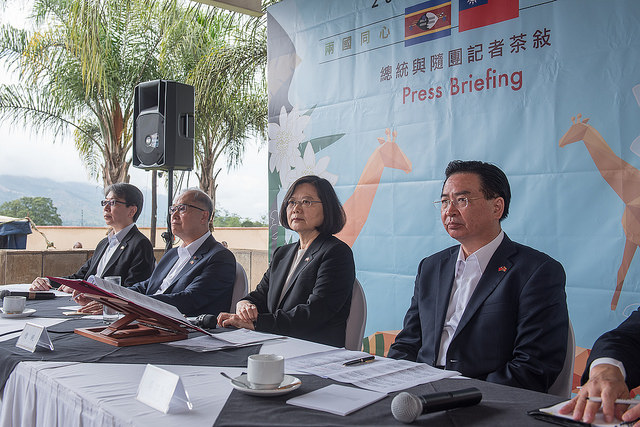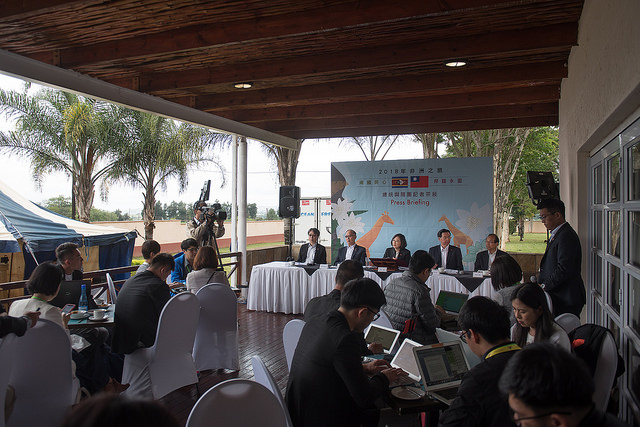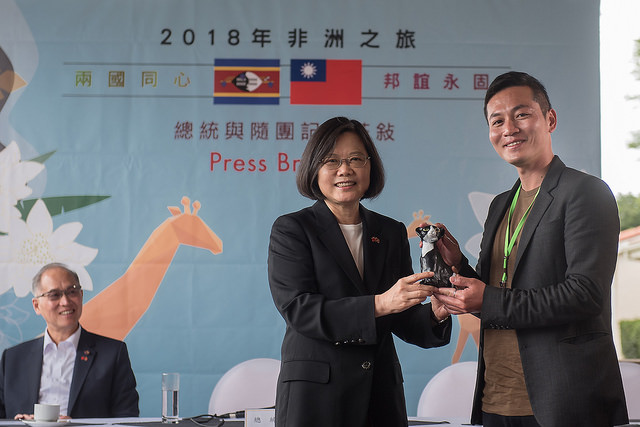News & activities
 News releases
News releases
President Tsai Ing-wen held a reception at her hotel in Swaziland for the press corps traveling with her delegation on the morning of April 20 local time (Friday afternoon Taipei time). At the gathering, she explained the trip's achievements and responded to questions from reporters.
In remarks, the president said that the main purpose of this trip was to participate in a double celebration on April 19 commemorating both King Mswati III's 50th birthday and the 50th anniversary of Swaziland's independence. This was also an opportunity to show appreciation to the many Taiwanese expatriates toiling in Africa. It was a demanding itinerary, and all of the trip objectives were achieved.
President Tsai pointed out that over the past several days, everyone was touched by King Mswati III's warm reception, and the strength of the friendly bilateral diplomatic ties was palpable.
The president said that maintaining any friendship is a long-term cumulative process, and also requires an eye toward future development. When she met with King Mswati III, the king said he looks forward to further developing economic and trade relations with Taiwan. The president told him that last month, Taiwan's Office of Trade Negotiations completed preparations so that Swaziland can export beef, cane sugar, pine wood, and seafood caught in the seas around Mozambique to Taiwan. "Of course," she added, "these imports will be subject to Taiwan's inspection and quarantine regulations."
The president also pointed out that Taiwan and Swaziland have agreed to sign an economic cooperation agreement providing preferential tariff treatment, with details to be determined in follow-up negotiations. However, she said, Taiwan will take a proactive approach to this issue.
President Tsai then mentioned that the government is encouraging Taiwanese businesses to use Swaziland as a springboard to expand their presence in Africa. Hua Nan Bank Vice-Chairman Tom Lin (林知延), who accompanied the delegation on this trip, said that Hua Nan Bank is considering establishing a branch in Swaziland.
The president emphasized that cooperation for mutual benefits is not limited to economics and trade, and during this trip Taiwan announced two new programs, one in education and one in agriculture. The first is a STEM education program that will see Taiwan help 100 outstanding Swazi students from underprivileged backgrounds complete the three-year curriculum at the Swaziland College of Technology, which the delegation had previously visited. The other is the Greenhouse Project, which will see Taiwan select four remote areas, and train local women in greenhouse techniques from seedling cultivation to production and marketing. The goal is for these women to become "seeds" for economic empowerment and agricultural extension.
President Tsai also mentioned that when the delegation visited Mbabane Government Hospital two days earlier, Taipei Medical University Hospital Superintendent Dr. Ray Jade Chen (陳瑞杰), who accompanied the delegation, said that the Taiwan Medical Mission is working far from home, and should be given adequate support. The president supported that idea wholeheartedly, as the achievements of Taiwan's overseas medical missions in medical diplomacy are well known. Those achievements are one important reason why other countries are willing to speak out every year to support Taiwan at the World Health Assembly (WHA).
Finally, the president stated that before this trip began, she promised we would "give our all for diplomacy." In fact, "giving our all for diplomacy" means more than just arriving at some destination. What's most important is to see what's lacking on the diplomatic front line, see what's needed, and see what methods we should use to enhance bilateral relations. That's "steadfast diplomacy," continuously strengthening friendships and achieving mutually beneficial win-win situations through personal involvement and experiences. This is how we "give our all for diplomacy," she said.
Afterwards, President Tsai responded to questions from the media about cross-strait relations, Taiwan's international participation, and other issues.
Commenting on mainland China's recent military exercises around Taiwan, President Tsai said that there has been some manipulation of the news and information surrounding those exercises. But overall, she stated, the government has been able to respond immediately. She emphasized that some of the things mainland China has done are things we've seen before. For Taiwan, our primary tasks are to improve national defense capabilities, safeguard our democracy, and develop our economy.
The president also made two appeals. First, she expressed hope that all interested parties in the region realize that maintaining regional peace and stability is everyone's shared responsibility. We do not wish to see any party change the regional status quo by any means. She said that Taiwan will do everything in its power to maintain regional peace and stability, and hopes that all interested parties in the region will work together to maintain the status quo of peace and stability. Second, the recent manipulation of news and information failed to cause alarm in Taiwan because the government acted appropriately by providing timely explanations and responses when the news broke. Another important reason for that failure was that many media outlets did not play along with the Chinese authorities attempt to manipulate the news, and for that, the president expressed her thanks. The president also made a point to remind Taiwan citizens and the media to maintain a certain level of skepticism, and avoid speculating, about national security-related information on media platforms that has not been verified by government authorities. The government, she added, will closely monitor such information and promptly provide citizens with accurate information.
Addressing WHA and international participation issues, the president said Taiwan has been providing diplomatic allies with medical and public health assistance for years with excellent results, and they are very appreciative. That's why they are willing to speak up for Taiwan's rights on the WHA issue. So the government will continue to communicate with diplomatic allies and find effective ways to facilitate Taiwan's participation in other international organizations.
Among those accompanying the president to the reception were National Security Council Secretary-General David T. Lee (李大維), National Security Council Deputy Secretary-General Tsai Ming-yen (蔡明彥), Minister of Foreign Affairs Joseph Wu (吳釗燮), and ROC Ambassador to Swaziland Thomas J.C. Chen (陳經銓).











